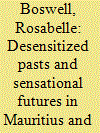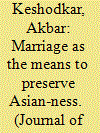|
|
|
Sort Order |
|
|
|
Items / Page
|
|
|
|
|
|
|
| Srl | Item |
| 1 |
ID:
164428


|
|
|
|
|
| Summary/Abstract |
This paper seeks to assert the relevance of ‘sensing’ identity in social analyses of the Southwest Indian Ocean islands. It is proposed that for some time, a broad concept of social change (specifically creolization) has been the reference point for understanding identity in the region. However, authors have tended to ignore the sensorial nature of human identity and the sensory experience of slavery and colonization. As a result, they have advanced a ‘sense’ less articulation of the islands and their inhabitants. Focusing on the senses in human identity and social experience, this article offers a sense-rich analysis of identity in the Southwest Indian Ocean region, revealing multidimensional senses of self in a diversity of social spaces. The author concludes that by fixating on historical dates, broad social processes and the interests of a largely patriarchal society, some scholars have desensitized the past, obfuscating the realities of and creativity emerging out of slavery and colonization. Sensorial analyses of identity in the Southwest Indian Ocean region open up new avenues for thinking about human/nature relations and politics, the nature of ‘culture’ and experiences of social change.
|
|
|
|
|
|
|
|
|
|
|
|
|
|
|
|
| 2 |
ID:
024398


|
|
|
|
|
| Publication |
Salaam, United Republic of Tanganyika, 1964.
|
| Description |
iii, 151p.pbk
|
| Contents |
Vol. II: Programmes, 1st July, 1964-30th June, 1969
|
|
|
|
|
|
|
|
|
|
|
|
Copies: C:1/I:0,R:0,Q:0
Circulation
| Accession# | Call# | Current Location | Status | Policy | Location |
| 012394 | 967.8204/TAN 012394 | Main | On Shelf | General | |
|
|
|
|
| 3 |
ID:
096046


|
|
|
|
|
| Publication |
2010.
|
| Summary/Abstract |
The question of identity, shaped by issues of race and ethnicity, is paramount in the multi-cultural ethnic landscape of Zanzibar. This article examines how the present-day Asian community of Zanzibar, decimated by the 1964 Revolution, when an African insurgence overthrew the islands' Arab rule and expelled the majority of Arabs and Asians, survived in Zanzibar in the years following the Revolution and how, through demarcating communal boundaries and exercising specific marriage strategies, it has managed to maintain its distinct Asian identity. The article is based on anthropological fieldwork in Zanzibar.
|
|
|
|
|
|
|
|
|
|
|
|
|
|
|
|
| 4 |
ID:
159553


|
|
|
|
|
| Summary/Abstract |
The popularity of unity governments to settle both internal political divisions and outright conflict has grown in the last 20 years. However, more often than not unity governments fail to mitigate the political dynamics baked into the political economies and suffer from being insufficiently anchored in local society. The Government of National Unity (GNU) in Zanzibar, formed in 2010 as the culmination of the ‘maridhiano’ political reconciliation process and following numerous attempts at reconciliation led to initial successes, is a case in point. Zanzibar's GNU turned out to be ‘position’ rather than ‘power’ sharing, constitutionalised through a hybrid format of the politics of continuity and collusion. As such the position sharing system broke down when voters in the 2015 election sought neither continuity nor collusion, but transformational change of governance. This was in turn blocked by veto actors in favour of continuity, resulting in the collapse and discontinuation of the GNU in Zanzibar.
|
|
|
|
|
|
|
|
|
|
|
|
|
|
|
|
| 5 |
ID:
099191


|
|
|
|
|
| Publication |
2010.
|
| Summary/Abstract |
Increasingly, scholarship on urban Africa has focused on the social construction of place in informal neighbourhoods. In this approach, researchers often highlight the fluidity, contingency, or creativity of the urban poor majority. Efforts to remake planning processes to work with or be driven by these informal everyday place-making strategies can be quite inspiring. Yet I question whether these ideas as put into practice in cities can be anything more than survival strategies of the abject poor. Historical-geographical roots and social relations with the state make each informal neighbourhood a particular case, and these factors have significant influence on people's capacity to make new, alternative statements with their urban places, or to create alternatives that might be replicated. This essay is based mainly around fieldwork in 2006-8 in Zanzibar's peri-urban West District shehia (locations) of Mwera and Welezo, including assessment of the built environments, interviews, archival work, and participant observation. I document ways in which these neighbourhoods are, despite newness, rooted in history and geography, and how residents' peri-urban everyday place making depends upon their relationships with the state. The internal heterogeneity of place making and social positioning proves difficult to contend with or deploy for alternative planning.
|
|
|
|
|
|
|
|
|
|
|
|
|
|
|
|
|
|
|
|
|